人教九年级英语全一册重点语法总结
人教初中英语九年级全一册知识点归纳总结
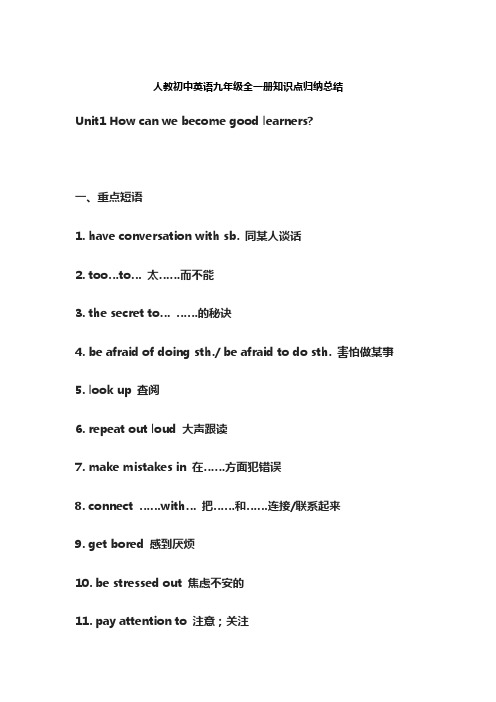
人教初中英语九年级全一册知识点归纳总结Unit1 How can we become good learners?一、重点短语1. have conversation with sb. 同某人谈话2. too…to…太……而不能3. the secret to………的秘诀4. be afraid of doing sth./ be afraid to do sth. 害怕做某事5. look up 查阅6. repeat out loud 大声跟读7. make mistakes in 在……方面犯错误8. connect ……with…把……和……连接/联系起来9. get bored 感到厌烦10. be stressed out 焦虑不安的11. pay attention to 注意;关注12. depend on 取决于;依靠13. the ability to do sth.. 做某事的能力二、考点详解1. by + doing 通过……方式(by是介词,后面要跟动名词,也就是动词的ing形式)2. talk about 谈论,议论,讨论The students often talk about movie after class. 学生们常常在课后讨论电影。
talk to sb= talk with sb 与某人说话3. 提建议的句子:①What/ how about +doing sth.? 做…怎么样?(about后面要用动词的ing形式,这一点考试考的比较多)如:What/ How about going shopping?②Why don't you + do sth.? 你为什么不做…?如:Why don't you go shopping?③Why not + do sth. ? 为什么不做…?如:Why not go shopping?④Let's + do sth. 让我们做…...吧。
人教版初三英语知识点总结

人教版初三英语知识点总结一、语法重点1. 时态- 一般现在时:表示经常发生的动作或状态。
- 一般过去时:表示过去发生的动作或状态。
- 现在进行时:表示正在进行的动作。
- 过去进行时:表示过去某一时刻正在进行的动作。
- 一般将来时:表示将来会发生的动作。
- 现在完成时:表示过去发生的动作对现在的影响或结果。
- 过去完成时:表示在过去某一动作之前已经完成的另一动作。
2. 语态- 被动语态:表示主语是动作的承受者。
- 一般现在时被动语态:am/is/are + past participle。
- 一般过去时被动语态:was/were + past participle。
- 现在进行时被动语态:am/is/are being + past participle。
- 一般将来时被动语态:will be + past participle。
3. 非谓语动词- 动名词:作为名词使用,表示动作。
- 分词:现在分词(表示正在进行)和过去分词(表示被动或完成)。
- 不定式:to + base form of verb,表示动作的目的、意图或结果。
4. 情态动词- can/could:表示能力或请求。
- may/might:表示可能性。
- must:表示必须或强烈义务。
- should/ought to:表示建议或应当。
5. 句子结构- 简单句:一个主语和一个谓语。
- 并列句:使用并列连词连接两个或多个简单句。
- 复合句:包含一个主句和至少一个从句。
- 定语从句:修饰名词或代词的从句。
- 状语从句:表示时间、地点、原因、条件、结果等。
二、词汇与短语1. 常见词汇- 描述人物特征的形容词:kind, honest, creative, etc.- 描述日常活动的动词短语:clean up, take out, turn off, etc.- 描述情感和情绪的名词:happiness, sadness, anger, etc. - 描述天气的词汇:sunny, rainy, windy, etc.2. 短语搭配- 动词短语搭配:finish doing, stop to do, remember to do, etc.- 形容词与介词的搭配:afraid of, interested in, good at, etc.- 常用口语表达:What's up?, How about…?, It's up to you, etc.三、阅读理解技巧1. 快速阅读(Skimming)- 快速浏览文章,抓住主旨大意。
人教版九年级英语知识点归纳

人教版九年级英语知识点归纳一、语法知识点1. 一般现在时:用于描述经常发生的行为或真相,动词原形加s/es。
2. 一般过去时:用于描述过去发生的动作或状态,动词过去式形式。
3. 现在进行时:用于描述当前正在进行的动作,be动词+动词ing形式。
4. 现在完成时:用于描述过去发生的动作对现在造成的影响,have/has + 过去分词。
5. 一般将来时:用于描述将来的动作,will/shall + 动词原形。
6. 情态动词:can, could, may, might, must, shall, should, will, would等,用于表达能力、可能性、推测、必要性等。
7. 定语从句:用于对名词进行修饰和限制,引导词有关系代词和关系副词。
8. 倒装句:用于强调句子中的某一部分,将助动词或情态动词放在主语之前。
9. 被动语态:用于强调动作的承受者,be动词+过去分词。
10. 状语从句:用于修饰句子中的动作或状态,引导词有时间、原因、条件等。
二、词汇知识点1. 动词短语:由动词和副词、介词构成的短语,如give up,look after, think of等。
2. 同义词和反义词:指意义相同或相反的词语,如happy和glad、buy和sell等。
3. 词汇拓展:指根据前缀、后缀或词形变化,拓展词汇的能力。
4. 高频词汇:指经常出现在九年级英语课本和考试中的单词,如important, improve, knowledge等。
5. 词义辨析:指对意义相近但用法不同的词进行区分,如listen和hear、borrow和lend等。
三、阅读技巧1. 主旨大意:通过阅读文章的首句、末句和段落标题等,找出文章的主题或中心思想。
2. 查找信息:通过快速阅读或扫读,找出与特定问题或关键词相关的信息。
3. 推理判断:根据文章中的暗示或细节推断出未写明的信息或作者的观点。
4. 阅读策略:如预测题目、通读全文、找关键词等,帮助提高阅读效率和准确性。
人教版九年级全一册英语Unit10重点语法知识点总结
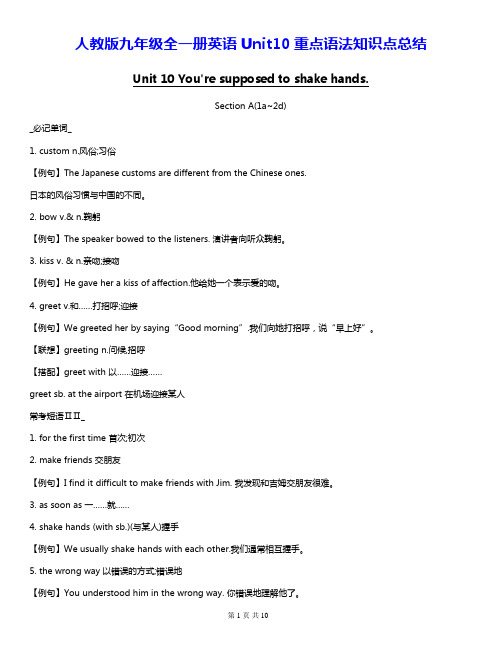
人教版九年级全一册英语Unit10重点语法知识点总结Unit 10 You're supposed to shake hands.Section A(1a~2d)_必记单词_1. custom n.风俗;习俗【例句】The Japanese customs are different from the Chinese ones.日本的风俗习惯与中国的不同。
2. bow v.& n.鞠躬【例句】The speaker bowed to the listeners. 演讲者向听众鞠躬。
3. kiss v. & n.亲吻;接吻【例句】He gave her a kiss of affection.他给她一个表示爱的吻。
4. greet v.和……打招呼;迎接【例句】We greeted her by saying“Good morning”.我们向她打招呼,说“早上好”。
【联想】greeting n.问候,招呼【搭配】greet with 以……迎接……greet sb. at the airport 在机场迎接某人常考短语ⅡⅡ_1. for the first time 首次;初次2. make friends 交朋友【例句】I find it difficult to make friends with Jim. 我发现和吉姆交朋友很难。
3. as soon as 一……就……4. shake hands (with sb.)(与某人)握手【例句】We usually shake hands with each other.我们通常相互握手。
5. the wrong way 以错误的方式;错误地【例句】You understood him in the wrong way. 你错误地理解他了。
6. hold out 伸出(手等)7. greet each other 互相问候8. to one’s surprise 令某人惊讶的是经典句型ⅢⅡ1. That's how people in Japan are expected to greet each other.那就是在日本人们互相问候的方式。
人教版九年级英语知识点总结
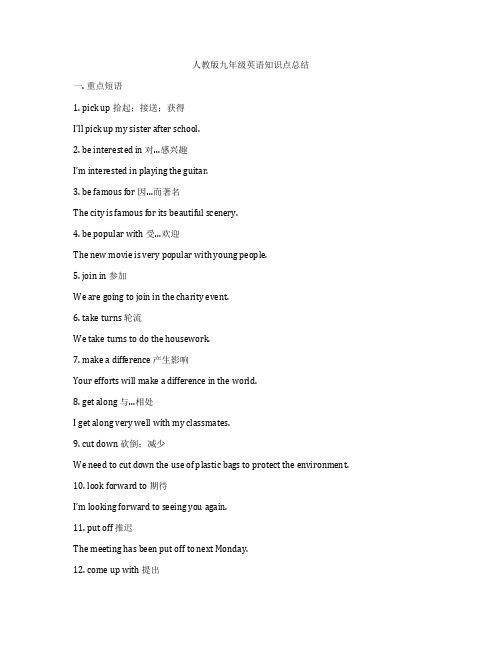
人教版九年级英语知识点总结一. 重点短语1. pick up 拾起;接送;获得I’ll pick up my sister after school.2. be interested in 对…感兴趣I’m interested in playing the guitar.3. be famous for 因…而著名The city is famous for its beautiful scenery.4. be popular with 受…欢迎The new movie is very popular with young people.5. join in 参加We are going to join in the charity event.6. take turns 轮流We take turns to do the housework.7. make a difference 产生影响Your efforts will make a difference in the world.8. get along 与…相处I get along very well with my classmates.9. cut down 砍倒;减少We need to cut down the use of plastic bags to protect the environment.10. look forward to 期待I’m looking forward to seeing you again.11. put off 推迟The meeting has been put off to next Monday.12. come up with 提出We need to come up with a plan for the project. 13. keep in touch 保持联系We keep in touch by sending emails.14. make up 编造;弥补She made up a story about why she was late.15. run out of 用完We have run out of milk and need to buy some more.二. 重点语法1. 一般现在时肯定句:主语 + V原 + 其他He plays football every weekend.否定句:主语 + do not/does not + V原 + 其他I do not like watching horror movies.疑问句:Do/Does + 主语 + V原 + 其他Do they enjoy playing basketball?2. 一般过去时肯定句:主语 + V-ed/Vt + 其他She visited Beijing last year.否定句:主语 + did not + V原 + 其他We did not go to the concert last night.疑问句:Did + 主语 + V原 + 其他Did you finish your homework yesterday?3. 现在进行时肯定句:主语 + am/is/are + V-ing + 其他She is watching TV now.否定句:主语 + am/is/are + not + V-ing + 其他He is not playing football at the moment.疑问句:Am/Is/Are + 主语 + V-ing + 其他Are you studying for the exam?4. 一般将来时肯定句:主语 + will + V原 + 其他She will travel to Japan next month.否定句:主语 + will not + V原 + 其他I will not forget to call you.疑问句:Will + 主语 + V原 + 其他Will he come to the party?5. 现在完成时肯定句:主语 + have/has + V过去分词 + 其他They have finished their homework.否定句:主语 + have/has + not + V过去分词 + 其他We have not seen this movie yet.疑问句:Have/Has + 主语 + V过去分词 + 其他Have you ever been to Paris?6. 被动语态肯定句:主语 + am/is/are + V过去分词 + 其他The book is written by my favorite author.否定句:主语 + am/is/are + not + V过去分词 + 其他The dishes are not washed by my brother.疑问句:Am/Is/Are + 主语 + V过去分词 + 其他Is the car fixed by the mechanic?三. 重点词汇1. 人物teacher 老师student 学生doctor 医生nurse 护士engineer 工程师pilot 飞行员musician 音乐家actor 演员writer 作家scientist 科学家athlete 运动员2. 动作run 跑步jump 跳跃swim 游泳dance 跳舞sing 唱歌play 演奏climb 爬山cook 烹饪paint 绘画ride 骑行3. 环境house 房子school 学校hospital 医院office 办公室library 图书馆park 公园beach 海滩mountain 山river 河lake 湖四. 重点句型1. 八大情态动词can 能够I can speak English fluently.could 过去能够She could play the piano when she was five. may 可能May I go to the restroom, please?might 可能It might rain this afternoon.must 必须You must finish your homework before 8pm. shall 将要Shall we go to the movies tonight?should 应该You should study for the exam tomorrow.will 将要We will visit the Great Wall next week.2. 祈使句Be quiet! 安静!Don’t be late! 别迟到!Sit down, please. 请坐下。
人教版九年级全一册英语Unit1单元语法知识点总结
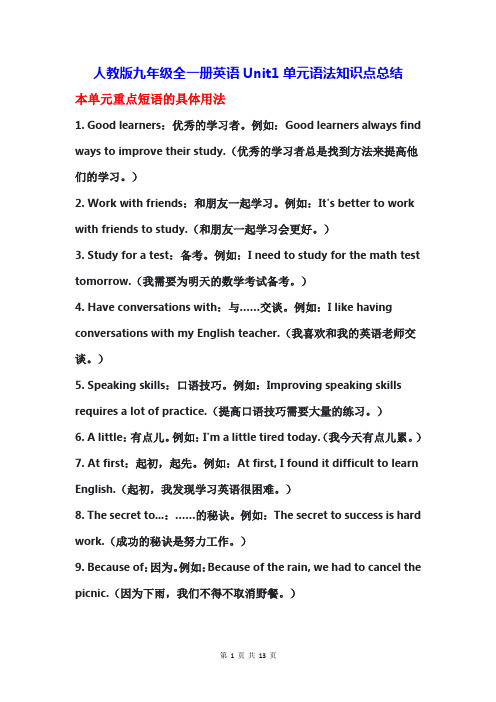
人教版九年级全一册英语Unit1单元语法知识点总结本单元重点短语的具体用法1. Good learners:优秀的学习者。
例如:Good learners always find ways to improve their study.(优秀的学习者总是找到方法来提高他们的学习。
)2. Work with friends:和朋友一起学习。
例如:It's better to work with friends to study.(和朋友一起学习会更好。
)3. Study for a test:备考。
例如:I need to study for the math test tomorrow.(我需要为明天的数学考试备考。
)4. Have conversations with:与……交谈。
例如:I like having conversations with my English teacher.(我喜欢和我的英语老师交谈。
)5. Speaking skills:口语技巧。
例如:Improving speaking skills requires a lot of practice.(提高口语技巧需要大量的练习。
)6. A little:有点儿。
例如:I'm a little tired today.(我今天有点儿累。
)7. At first:起初,起先。
例如:At first, I found it difficult to learn English.(起初,我发现学习英语很困难。
)8. The secret to...:……的秘诀。
例如:The secret to success is hard work.(成功的秘诀是努力工作。
)9. Because of:因为。
例如:Because of the rain, we had to cancel the picnic.(因为下雨,我们不得不取消野餐。
人教版九年级英语(全册)重点语法知识点复习梳理

人教版九年级英语(全册)重点语法知识点复习梳理人教版九年级英语重点语法知识点复习梳理一.介词by的用法(Unit-1重点语法)1.意为“在……旁”,“靠近”。
Some are singing and dancing under a big tree. Some are drawing by the lake.有的在大树下唱歌跳舞。
有的在湖边画画儿。
2.意为“不迟于”,“到……时为止”。
Your son will be all right by supper time.你的儿子在晚饭前会好的。
How many English songs had you learned by the end of last term?到上个学期末你们已经学了多少首英语歌曲?3.表示方法、手段,可译作“靠”、“用”、“凭借”、“通过”、“乘坐”等。
The monkey was hanging from the tree by his tail and laughing.猴子用尾巴吊在树上哈哈大笑。
The boy’s father was so thankful that he taug ht Edison how to send messages byrailway telegraph.孩子的父亲是那末的感谢,因而他教爱迪生怎样经由过程铁路电报来转达息。
4.透露表现“逐个”,“逐批”的意思。
One by one they went past the table in the dark.他们一个一个得在黑暗中颠末这张桌子。
5.表示“根据”,“按照”的意思。
What time is it by your watch?你的表几点了?6.和take , hold等动词连用,说明接触身体的某一部分。
I took him by the hand.我拉住了他的手。
7.用于被动句中,表示行为主体,常译作“被”、“由”等。
English is spoken by many people.英语被许多人说。
人教版九年级全一册英语Unit3单元语法知识点总结
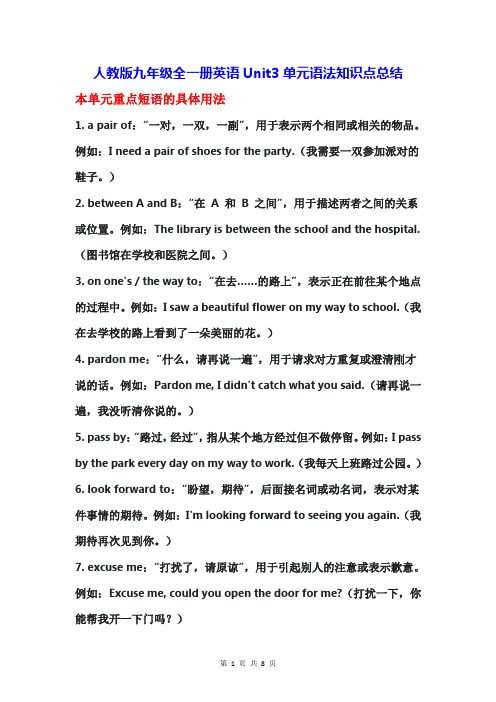
人教版九年级全一册英语Unit3单元语法知识点总结本单元重点短语的具体用法1. a pair of:“一对,一双,一副”,用于表示两个相同或相关的物品。
例如:I need a pair of shoes for the party.(我需要一双参加派对的鞋子。
)2. between A and B:“在A 和B 之间”,用于描述两者之间的关系或位置。
例如:The library is between the school and the hospital.(图书馆在学校和医院之间。
)3. on one's / the way to:“在去……的路上”,表示正在前往某个地点的过程中。
例如:I saw a beautiful flower on my way to school.(我在去学校的路上看到了一朵美丽的花。
)4. pardon me:“什么,请再说一遍”,用于请求对方重复或澄清刚才说的话。
例如:Pardon me, I didn't catch what you said.(请再说一遍,我没听清你说的。
)5. pass by:“路过,经过”,指从某个地方经过但不做停留。
例如:I pass by the park every day on my way to work.(我每天上班路过公园。
)6. look forward to:“盼望,期待”,后面接名词或动名词,表示对某件事情的期待。
例如:I'm looking forward to seeing you again.(我期待再次见到你。
)7. excuse me:“打扰了,请原谅”,用于引起别人的注意或表示歉意。
例如:Excuse me, could you open the door for me?(打扰一下,你能帮我开一下门吗?)8. get some information about:“获取有关……的一些信息”,用于表示获取关于某个主题的信息。
人教版九年级全一册英语Unit12单元语法知识点总结
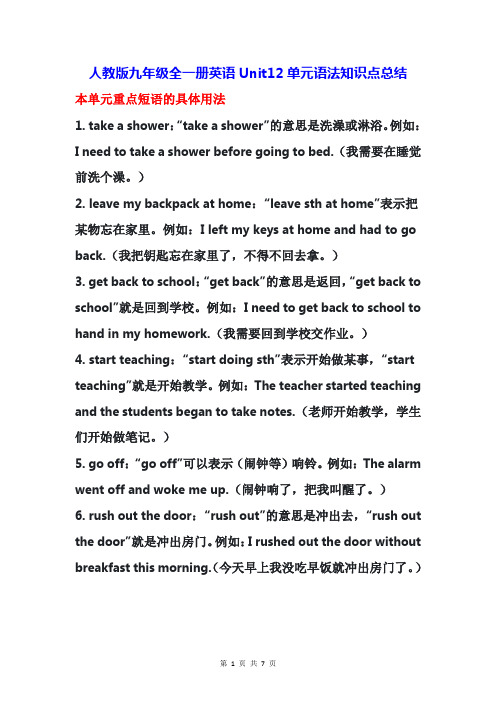
人教版九年级全一册英语Unit12单元语法知识点总结本单元重点短语的具体用法1. take a shower:“take a shower”的意思是洗澡或淋浴。
例如:I need to take a shower before going to bed.(我需要在睡觉前洗个澡。
)2. leave my backpack at home:“leave sth at home”表示把某物忘在家里。
例如:I left my keys at home and had to go back.(我把钥匙忘在家里了,不得不回去拿。
)3. get back to school:“get back”的意思是返回,“get back to school”就是回到学校。
例如:I need to get back to school to hand in my homework.(我需要回到学校交作业。
)4. start teaching:“start doing sth”表示开始做某事,“start teaching”就是开始教学。
例如:The teacher started teaching and the students began to take notes.(老师开始教学,学生们开始做笔记。
)5. go off:“go off”可以表示(闹钟等)响铃。
例如:The alarm went off and woke me up.(闹钟响了,把我叫醒了。
)6. rush out the door:“rush out”的意思是冲出去,“rush out the door”就是冲出房门。
例如:I rushed out the door without breakfast this morning.(今天早上我没吃早饭就冲出房门了。
)7. give sb a lift:“give sb a lift”的意思是让某人搭车、捎某人一程。
人教版九年级全一册英语Unit11单元语法知识点总结
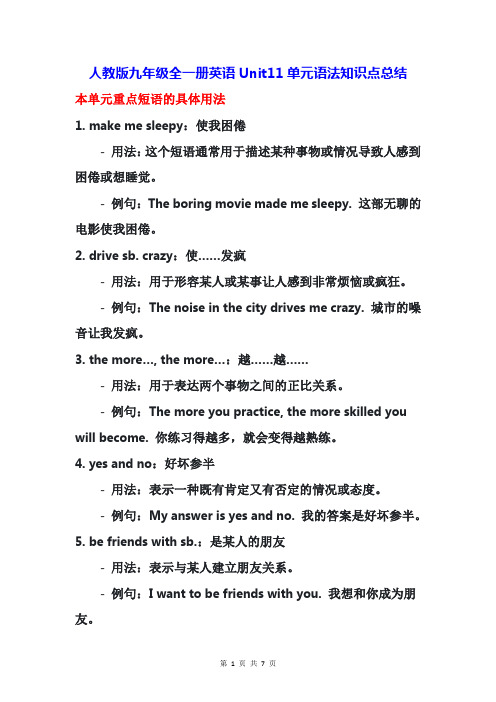
人教版九年级全一册英语Unit11单元语法知识点总结本单元重点短语的具体用法1. make me sleepy:使我困倦- 用法:这个短语通常用于描述某种事物或情况导致人感到困倦或想睡觉。
- 例句:The boring movie made me sleepy. 这部无聊的电影使我困倦。
2. drive sb. crazy:使……发疯- 用法:用于形容某人或某事让人感到非常烦恼或疯狂。
- 例句:The noise in the city drives me crazy. 城市的噪音让我发疯。
3. the more…, the more…:越……越……- 用法:用于表达两个事物之间的正比关系。
- 例句:The more you practice, the more skilled you will become. 你练习得越多,就会变得越熟练。
4. yes and no:好坏参半- 用法:表示一种既有肯定又有否定的情况或态度。
- 例句:My answer is yes and no. 我的答案是好坏参半。
5. be friends with sb.:是某人的朋友- 用法:表示与某人建立朋友关系。
- 例句:I want to be friends with you. 我想和你成为朋友。
6. feel left out:感觉被忽视- 用法:描述某人感到被冷落或排除在某个群体之外。
- 例句:I always feel left out in group activities. 在团队活动中,我总是感觉被忽视。
7. sleep badly:睡眠很差- 用法:形容睡眠质量不好。
- 例句:I slept badly last night. 昨晚我睡眠很差。
8. don't feel like eating:不想吃东西- 用法:表示没有食欲或不想吃东西。
- 例句:I don't feel like eating anything today. 今天我不想吃东西。
人教版九年级全一册单元重点短语归纳总结(完整版)

人教版九年级全一册单元重点短语归纳总结Unit 1be born with… 天生具有……pay attention to… 关注……connect…with… 把……和……连接起来have a good knowledge of… 掌握……spoken English英语口语make mistakes/make a mistake 犯错,出错get the pronunciation right正确地发音join an English club参加一个英语俱乐部practice speaking English练习说英语by mistake错误地written English书面英语keep the secret保守秘密at a speed of… 以……的速度increase by… 增加了……increase to… 增加到……something important某件重要的事情by the way顺便问一下by accident = by chance偶然地by mistake错误地one by one一个接一个step by step一步一步地little by little逐渐地by the time… 到……为止by oneself独自地shake sb. by the hand和某人握手in English用英语in ink用墨水speak in a loud voice大声地讲in red穿红色的衣服find out… 查清楚……,弄明白……lost and found失物招领be interested in… 对……感兴趣take an interest in … 对……感兴趣enjoy oneself玩得开心,过得愉快pick up捡起,拾起,无意中学习到,接听look up向上看,查阅cut up切碎mix up混合give up放弃put up搭建;张贴take up开始做,占cheer up振奋起来Unit 2put on… 穿上……,增加……lay out排版,布置end up… 结束……at present目前,现在go…for one’s vacation去……度假enjoy doing sth.喜欢做某事eat out在外面吃five meals a day每天5顿饭in two weeks在两周之后sound like… 听起来像……from…to… 从……到……be similar to… 与……相似wash away… 洗掉……have good luck有好运气in the new year在新的一年里play a trick on… 戏弄……dress up化妆打扮dress up as… 打扮成…….care about… 关心……make money挣钱used to do sth. 过去常常做某事make plans to do sth. 制定计划做某事make a plan for… 制定……的计划The Spring Festival春节The Lantern Festival元宵节The Mid-Autumn Festival中秋节The Dragon Boat Festival端午节The Water Festival泼水节Christmas Day圣诞节April Fool’s Day愚人节put on… 增加(体重);发胖;穿上……throw ... at ... 朝……扔……throw away 扔掉Unit 3pass by… 通过……pardon me对不起,打扰一下parking lot停车场in a rush匆忙地,仓促地rush hour(交通)高峰期,拥堵时刻drive sb. into a corner逼得某人走投无路turn a corner拐过街角around the corner在拐角处, 在近处, 即将来到in the corner在角落里(在建筑物内部)on / at the corner在拐角处(在建筑物外部) make a request要求by underground坐地铁apart from… 除此之外……give up放弃give away捐赠give in屈服,投降give out分发It’s convenient to do sth. 做某事是便利的Unit 4from time to time有时deal with… 处理……,应付……be proud of… 为……感到自豪in person亲自take pride in… 为……感到自豪look after… 照顾……take after… 长得像……agree with… 同意……compare…with… 把……和……比较take care of… 照顾……look for… 寻找……look up向上看;查阅look into… 调查……worry about… 担心……think of… 想……,认为……pay attention to… 关注……look forward to… 盼望……a sense of humor幽默感in silence沉默,安静keep silent保持安静help sb. with sth. 帮助某人某事help sb. do/to do sth. 帮助某人做某事with one’s help = with the help of sb. 在某人的帮助下have influence on sth. = have an effect on sth.对……由影响take up开始,从事,接纳,占据,继续做take off起飞,脱下,动身take on承担,呈现take over接受,接管,借用,接办take down记下,取下take place发生,进行,举行take a look看一下take a walk散步take away带走,拿走,取走take care of… 照顾……,注意……,抚养……take charge掌管,负责be absent from… 缺席……in general = generally总体上generally speaking 总而言之,总的来说deal with… 应对……,处理……a big thing 一件大事情get tons of attention被众人所关注tons of sth.很多,极多personally speaking就个人而言Unit 5no matter… 无论……even though即使by hand用手seat belt安全带see a film看电影watch the movies看电影read a book看书,读书as long as… 只要……as soon as… 一……就……as far as… 和……一样远;根据……as well as… 也;又;和have sth. in common有……共同之处in trouble陷入麻烦in style时髦地instead of… 代替……,而不是……as for… 至于……private cars私家车try one’s best to do sth.尽力做某事in fact事实上according to… 根据……such as… 诸如……,例如……be made of…(原材料) 由……制成的(看得出原材料)be made from…(原材料) 由……制成的(看不出原材料)be made by sb. 被某人制成be made in…(地点) 在哪里制成be made into… (制成品) 被制成……be known / famous as… 作为……而出名be known / famous for… 因……而著名be known to… 为……所知/熟知turn…into… 把……变成……;使……变成……leave for… 出发到某处avoid doing sth. 避免做某事Unit 6take place发生without doubt毫无疑问all of a sudden突然by mistake错误地divide…into… 把……分成……on purpose故意地look up to… 仰视……be similar to… 与……相似the same as… 与……相同be different from… 与……不同so far到目前为止clean up大扫除set up建立go off(闹钟等)响起get off… 下车……get on… 上车……translate…into… 把……翻译成……with pleasure我的荣幸;不客气have a point有道理be used for doing sth. 被用来做某事think about… 考虑……,想起……think of… 考虑……,记忆……,记起……think sth. over 仔细想,审慎思考,作进一步考虑think sth. out 想通,想出,熟思There is no doubt that+句子毫无疑问divide… into… 把……分开,分散look back回头看,回顾look down upon (on)… 看不起……,轻视……look forward to… 盼望……,期待……look into… 朝......看去,调查……look like… 看上去像……look on… 旁观……,观望……look out当心,小心,留神look through… 浏览……,透过......看look up查阅,抬头看Unit 7take it easy放轻松in general大体上thousands of… 数以千计的……as soon as possible尽可能快be willing to… 乐意……quite a few相当多dream of/about… 梦想……hold on to… 坚持……come true实现have a chance有机会have a cold感冒have the flu患流感invite sb to do sth. 邀请某人去做某事fix up修理I hope so/not.我希望如此/不这样make up编造;捏造;化妆dress up穿衣打扮have to do with… 与……无关take the place of… 取代……No way! 不,决不,没门give sb. a hug拥抱某人give sb. a lift让某人搭便车talk back回嘴,顶嘴,顶撞talk about… 谈论……,谈到……talk over…商议……talk to…与……说话talk with…和……交谈talk to oneself自言自语stay out不回家,避开get in the way of… 挡……的路,妨碍in a way (= in one way/in some ways)从某一角度看,在某种程度上in the way挡路on one’s way (to…) 在去……的路上in no way决不(置于句首,句子要倒装)by the way顺便问make a choice做出选择have no choice but to do sth. 除了做某事以外,别无选择或只好做某事choose to do sth. 选择做某事provide sb. with sth. 提供某人某物provide sth. for sb. 提供某物给某人offer sb. sth. 提供某人某物offer sth. to sb. 提供某物给某人offer to do sth. 提供做某事Unit 8give out分发clean up大扫除put off推迟;拖延set up建立think up想出,想到take after… 长得像……fix up修理give away捐赠put up搭建,张贴ask for… 要求……hand out分发work out解决help (sb.) out帮助(某人)走出困境at once立刻,马上at that time在那时at the same time同时from time to time有时on time准时all the time一直,总是once upon a time很久以前search for… 寻找……belong to… 属于……have fun doing sth. 做某事玩得愉快=have a good time doing sth.=enjoy doing sth.prevent sb. from doing 阻止某人做某事= stop sb. from doingUnit 9in that case那样的话,在那种情况下stick to… 坚持……plenty of… 大量……,许多……shut off… 关闭……once in while 偶尔look up查阅in total总计try one’s best to do sth.尽力做某事at first首先at least至少at most至多part with… 放弃……,卖掉……,交出……prefer (doing) sth. to (doing) sth. 比起……更喜欢……prefer to do sth. 宁愿做某事prefer to do sth. rather than do sth. 宁愿做……而不愿做……shut up 闭嘴in a sense在某种程度上be popular with/ among… 深受……的欢迎Unit 10drop by顺便拜访after all毕竟,终究get mad生气make an effort努力clean… off 清除……take off起飞go out of one’s way 格外努力make… feel at home使……宾至如归get used to doing sth. 习惯于做某事expect to do sth. 期待做某事find out弄清楚hang out闲逛check out退房eat out外出吃饭be supposed to do sth. 应该……,被期望做……drop by… 顺便拜访……,随便进入……above all最重要,首先after all毕竟,别忘了at all丝毫,根本first of all首先in all总共make an effort to do sth. 努力做某事go out of one’s way 特地,格外努力Unit 11drive sb. crazy/mad把某人弄疯了the more…the more… 越怎么样就越怎么样be friends with (sb.) 和某人成为朋友leave out遗漏call in… 叫来……neither… nor… 既不……也不……to start with首先kick sb. off使某人离开;开除be hard on sb.对某人苛刻rather than… 并非……,而不是……pull together团结起来search for… 寻找……even though即使return to… 归还……as a result作为结果in fact事实上such as… 诸如……more than… 超过……come up with… 提出……,想出……get on with… 和……相处would rather do sth. than do sth. 宁愿做某事而不愿做某事= prefer to do sth. rather than do sth.drive sb. crazy/mad 使某人发疯/发狂Why don’t you + do sth.? = Why not + do sth.? 为何不……?be /feel left out被遗忘,被忽略,被冷落feel like doing sth. = want to do sth. 想要做……keep one’s eyes on sth. 盯着……keep an eye on… 留意……,照看……kick sb. off sth. 使某人离开,开除,逐出be hard on sb.对……很严厉,要求很苛刻;苛待(为难)某人Unit 12give…a lift给某人搭便车by the time (that)… 在……以前;到……时候为止in line with… 与……并驾齐驱show up炫耀by the end of… 截至……costume party化妆舞会sell out卖光keep doing sth. 一直做某事stay up熬夜grow up长大wake up醒来pay for… 支付……ask for… 要求……go out出去go away离开go over复习rush out of… 从……冲出去,冲出……even though 即使,虽然,尽管in disbelief不相信,疑惑,怀疑take off 脱掉,起飞,(事业)走红play jokes/a joke on… 戏弄……play a trick / tricks on sb. 捉弄某人make fun of… 捉弄……,取笑……make fool of… 愚弄……,戏弄……laugh at… 嘲笑……get married to sb.嫁/娶某人,与某人结婚Unit 13make a difference起作用be harmful to… 对……有害take part in… 参加……turn off… 关闭……turn on… 打开……turn up… 调高……;出现……turn down关小,拒绝throw away扔掉put sth. to good use 充分利用pull ... down拆掉……,摧毁……upside down上下翻转bring back使记起,恢复try to do sth. = try one’s best to do sth. 努力去做某事be related to… 与……有关play a part in 在……方面起作用,在……中扮演角色make a difference (to…) (对……) 产生影响或作用be harmful to doing sth. = do harm to doing sth. 对……有害at the top of … 在……最高地位,用最高(大)的(速度,声音等) turned upside down被翻转过来的,被颠倒过来的Unit 14in a row连续几次地help sb. with sth. 帮助某人干某事=help sb. do sth./ help sb. to do sth.help oneself 自助,(进餐时) 自己取用can’t help doing sth. 禁不住做某事with the help of… 在……的帮助下degree of………的程度,……的学位in one’s degree按照其本身的情况(或程度)to a degree在某种程度上,在一定程度上,非常to some degree在某种程度上有点,稍微believe in信任,信赖(=trust in / on)look forward to doing sth. 希望/期望做某事set out出发,开始,陈述set about sth./doing sth. 着手做某事set off动身,出发,燃放(鞭炮等),使……爆炸或发出响声set up竖起来,支起来,建立,成立set aside放在一边,搁置,存蓄,留下。
人教版初中英语九年级全册语法知识点汇总.docx
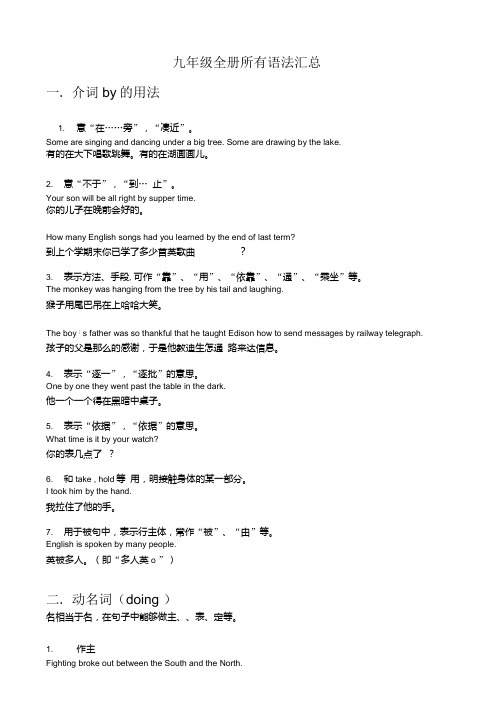
九年级全册所有语法汇总一. 介词by的用法1. 意“在……旁”,“凑近”。
Some are singing and dancing under a big tree. Some are drawing by the lake.有的在大下唱歌跳舞。
有的在湖画画儿。
2. 意“不于”,“到… 止”。
Your son will be all right by supper time.你的儿子在晚前会好的。
How many English songs had you learned by the end of last term?到上个学期末你已学了多少首英歌曲?3. 表示方法、手段,可作“靠”、“用”、“依靠”、“通”、“乘坐”等。
The monkey was hanging from the tree by his tail and laughing.猴子用尾巴吊在上哈哈大笑。
The boy ; s father was so thankful that he taught Edison how to send messages by railway telegraph. 孩子的父是那么的感谢,于是他教迪生怎通路来达信息。
4. 表示“逐一”,“逐批”的意思。
One by one they went past the table in the dark.他一个一个得在黑暗中桌子。
5. 表示“依据”,“依据”的意思。
What time is it by your watch?你的表几点了?6. 和take , hold等用,明接触身体的某一部分。
I took him by the hand.我拉住了他的手。
7. 用于被句中,表示行主体,常作“被”、“由”等。
English is spoken by many people.英被多人。
(即“多人英o ”)二. 动名词(doing )名相当于名,在句子中能够做主、、表、定等。
人教版初中英语九年级全册各单元知识点、语法归纳整理
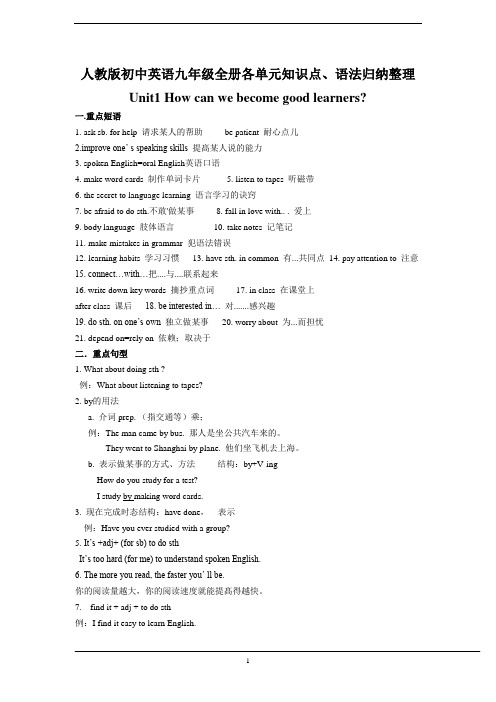
人教版初中英语九年级全册各单元知识点、语法归纳整理Unit1 How can we become good learners?一.重点短语1. ask sb. for help 请求某人的帮助be patient 耐心点儿2.improve one’ s speaking skills 提髙某人说的能力3. spoken English=oral English英语口语4. make word cards 制作单词卡片5. listen to tapes 听磁带6. the secret to language learning 语言学习的诀窍7. be afraid to do sth.不敢'做某事8. fall in love with.. . 爱上9. body language 肢体语言10. take notes 记笔记11.make mistakes in grammar 犯语法错误12.learning habits 学习习惯13. have sth. in common 有...共同点14. pay attention to 注意15. connect…with…把....与....联系起来16. write down key words 摘抄重点词17. in class 在课堂上after class 课后18. be interested in… 对.......感兴趣19. do sth. on one’s own 独立做某事20. worry about 为...而担忧21. depend on=rely on 依赖;取决于二.重点句型1. What about doing sth ?例:What about listening to tapes?2.by的用法a. 介词 prep. (指交通等)乘;例:The man came by bus. 那人是坐公共汽车来的。
人教版九年级全一册英语Unit8重点语法知识点复习提纲

人教版九年级全一册英语Unit8重点语法知识点复习提纲一、一般过去时1. 表示过去某个时间发生的动作或存在的状态。
2. 构成:主语 + 动词过去式 + 其他3. 示例:- I visited my grandparents last weekend.- He played basketball with his friends yesterday.二、一般将来时1. 表示将来某个时间发生的动作或存在的状态。
2. 构成:主语 + will + 动词原形 + 其他3. 示例:- We will have a party next week.- She will visit her aunt tomorrow.三、现在完成时1. 表示过去发生的动作对现在造成的影响或仍然持续的状态。
2. 构成:主语 + have/has + 过去分词 + 其他3. 示例:- They have finished their homework.- He has lived in Shanghai for five years.四、被动语态1. 用于强调动作的承受者而不是执行者。
2. 构成:被动语态的构成:be (am/is/are/was/were) + 过去分词 + 其他3. 示例:- The book was written by Mark Twain.- The house is being cleaned by my mom.五、情态动词1. 表示能力、可能性、建议、请求等情态。
2. 构成:情态动词 + 动词原形 + 其他3. 示例:- She can swim very well.- You should study harder for the exam.六、条件句1. 表示某个条件成立时,会发生的结果。
2. 构成:- 真实条件句:If + 现在时,将来时(If + 现在时,主将从现) - 虚拟条件句:If + 过去时,would/could/might + 动词原形(If + 主过去时,主将从过)3. 示例:- If it rains tomorrow, we will stay at home.- If I were you, I would go to the concert.七、比较级和最高级1. 表示两个或多个事物在某个方面的大小、程度等比较关系。
人教版九年级英语全册知识点归纳
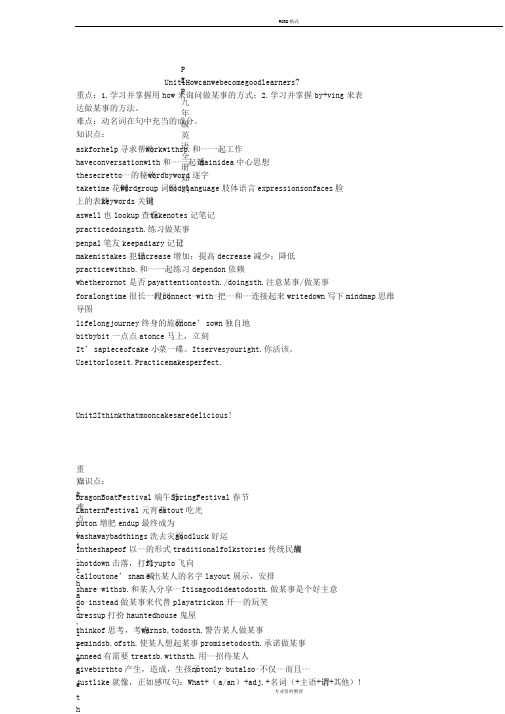
P E P 九年级英语全册知纳 Unit1Howcanwebecomegoodlearners? 重点:1.学习并掌握用how 来询问做某事的方式;2.学习并掌握by+ving 来表 达做某事的方法。
难点:动名词在句中充当的成分。
知识点: askforhelp 寻求帮助w orkwithsb.和⋯⋯一起工作 haveconversationwith 和⋯⋯一起对话mainidea 中心思想thesecretto ⋯⋯的秘诀w ordbyword 逐字 taketime 花时间w ordgroup 词组b odylanguage 肢体语言expressionsonfaces 脸上的表情k eywords 关键词aswell 也lookup 查看t akenotes 记笔记 practicedoingsth.练习做某事 penpal 笔友keepadiary 记日记makemistakes 犯错i ncrease 增加;提高decrease 减少;降低 practicewithsb.和⋯⋯一起练习dependon 依赖whetherornot 是否payattentiontosth./doingsth.注意某事/做某事foralongtime 很长一段时间c onnect ⋯with ⋯把⋯⋯和⋯⋯连接起来writedown 写下mindmap 思维导图lifelongjourney 终身的旅程o none ’sown 独自地 bitbybit 一点点atonce 马上,立刻It ’sapieceofcake 小.菜一碟。
Itservesyouright.你活该。
Useitorloseit.Practicemakesperfect.Unit2Ithinkthatmooncakesaredelicious!重点&难点:1.that,if知识点:DragonBoatFestival 端午节S pringFestival 春节 LanternFestival 元宵节e atout 吃光 puton 增肥endup 最终成为 washawaybadthings 洗去灾祸g oodluck 好运intheshapeof 以⋯⋯的形式traditionalfolkstories 传统民间故事 shotdown 击落,打垮f lyupto 飞向 calloutone ’snam 喊e 出某人的名字layout 展示,安排 share ⋯withsb.和某人分享⋯⋯Itisagoodideatodosth.做某事是个好主意 do ⋯instead 做某事来代替playatrickon 开⋯⋯的玩笑 dressup 打扮hauntedhouse 鬼屋 thinkof 思考,考虑w arnsb,todosth.警告某人做某事 remindsb.ofsth.使某人想起某事promisetodosth.承诺做某事1Unit3Couldyoupleasetellmewheretherestroomare?重点:学习并掌握wh-&how 所引导的宾语从句。
人教版九年级语法总结
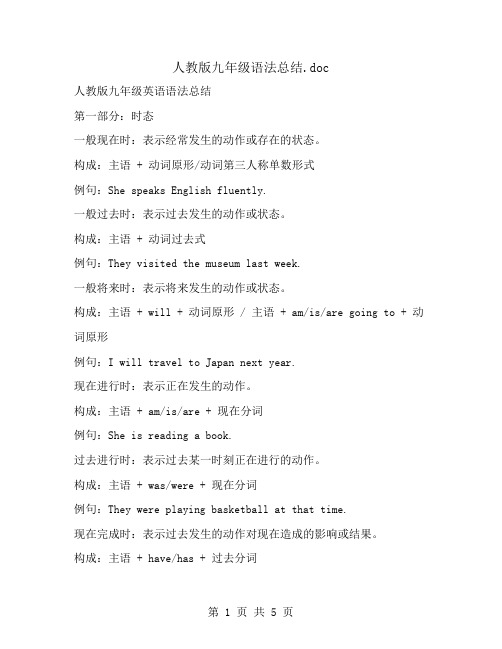
人教版九年级语法总结.doc人教版九年级英语语法总结第一部分:时态一般现在时:表示经常发生的动作或存在的状态。
构成:主语 + 动词原形/动词第三人称单数形式例句:She speaks English fluently.一般过去时:表示过去发生的动作或状态。
构成:主语 + 动词过去式例句:They visited the museum last week.一般将来时:表示将来发生的动作或状态。
构成:主语 + will + 动词原形 / 主语 + am/is/are going to + 动词原形例句:I will travel to Japan next year.现在进行时:表示正在发生的动作。
构成:主语 + am/is/are + 现在分词例句:She is reading a book.过去进行时:表示过去某一时刻正在进行的动作。
构成:主语 + was/were + 现在分词例句:They were playing basketball at that time.现在完成时:表示过去发生的动作对现在造成的影响或结果。
构成:主语 + have/has + 过去分词例句:I have finished my homework.过去完成时:表示过去的过去完成的动作。
构成:主语 + had + 过去分词例句:She had finished her homework before I called her. 将来进行时:表示将来某一时刻正在进行的动作。
构成:主语 + will be + 现在分词例句:He will be studying at that time.将来完成时:表示将来某一时间之前完成的动作。
构成:主语 + will have + 过去分词例句:We will have finished the project by next month. 第二部分:被动语态一般现在时被动语态:am/is/are + 过去分词例句:The letter is written by him.一般过去时被动语态:was/were + 过去分词例句:The house was built in 2010.一般将来时被动语态:will be + 过去分词例句:A new school will be built next year.现在完成时被动语态:have/has been + 过去分词例句:The problem has been solved.其他时态的被动语态:相应时态的构成+过去分词例句:The book was being read by her when I entered.第三部分:非谓语动词动名词:动词+ing,用作主语、宾语等。
人教九年级全册英语语法考点总结,中考必备知识点

人教九年级英语语法考点总结,中考必备知识点一. 介词by的用法1. 意为“在……旁”,“靠近”。
Some are singing and dancing under a big tree. Some are drawing by the lake.有的在大树下唱歌跳舞。
有的在湖边画画儿。
2. 意为“不迟于”,“到……时为止”。
Your son will be all right by supper time.你的儿子在晚饭前会好的。
How many English songs had you learned by the end of last term?到上个学期末你们已经学了多少首英语歌曲?3. 表示方法、手段,可译作“靠”、“用”、“凭借”、“通过”、“乘坐”等。
The monkey was hanging from the tree by his tail and laughing.猴子用尾巴吊在树上哈哈大笑。
The boy’s father was so thankful that he taught Edison how to send messages by railway telegraph. 孩子的父亲是那么的感激,于是他教爱迪生怎样通过铁路电报来传达信息。
4. 表示“逐个”,“逐批”的意思。
One by one they went past the table in the dark.他们一个一个得在黑暗中经过这张桌子。
5. 表示“根据”,“按照”的意思。
What time is it by your watch?你的表几点了?6. 和take , hold等动词连用,说明接触身体的某一部分。
I took him by the hand.我拉住了他的手。
7. 用于被动句中,表示行为主体,常译作“被”、“由”等。
English is spoken by many people.英语被许多人说。
人教版九年级全一册各单元的重点短语及语法知识点汇总
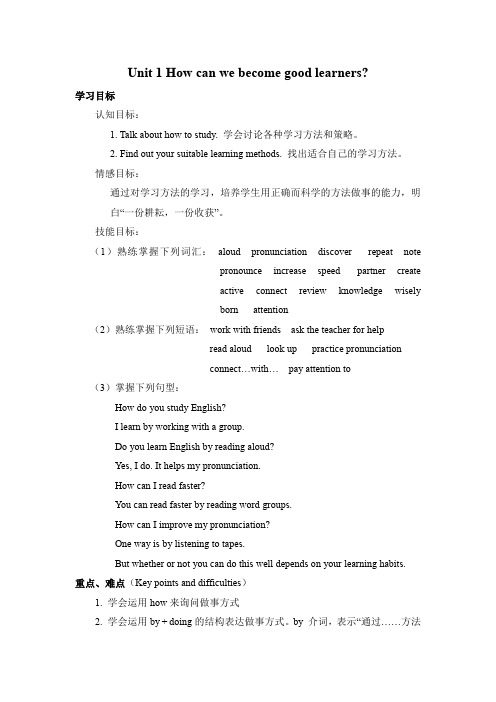
Unit 1 How can we become good learners?学习目标认知目标:1. Talk about how to study. 学会讨论各种学习方法和策略。
2. Find out your suitable learning methods. 找出适合自己的学习方法。
情感目标:通过对学习方法的学习,培养学生用正确而科学的方法做事的能力,明白“一份耕耘,一份收获”。
技能目标:(1)熟练掌握下列词汇:aloud pronunciation discover repeat notepronounce increase speed partner createactive connect review knowledge wiselyborn attention(2)熟练掌握下列短语:work with friends ask the teacher for helpread aloud look up practice pronunciationconnect…with… pay attention to (3)掌握下列句型:How do you study English?I learn by working with a group.Do you learn English by reading aloud?Yes, I do. It helps my pronunciation.How can I read faster?You can read faster by reading word groups.How can I improve my pronunciation?One way is by listening to tapes.But whether or not you can do this well depends on your learning habits.重点、难点(Key points and difficulties)1. 学会运用how来询问做事方式2. 学会运用by + doing的结构表达做事方式。
- 1、下载文档前请自行甄别文档内容的完整性,平台不提供额外的编辑、内容补充、找答案等附加服务。
- 2、"仅部分预览"的文档,不可在线预览部分如存在完整性等问题,可反馈申请退款(可完整预览的文档不适用该条件!)。
- 3、如文档侵犯您的权益,请联系客服反馈,我们会尽快为您处理(人工客服工作时间:9:00-18:30)。
人教九年级英语全一册重点语法总结1. 一般现在时:经常或习惯性的动作或者状态结构:主语+动词原形/动词现三单形式+宾语I like apples 我喜欢苹果He likes apples 他喜欢苹果标志词:everyday 每天,usually 通常,always 一直,sometimes 有时,often经常动词现三单变化的规则:一般+s,例如:play---plays以sh,ch,x,s 结尾力口es,例女口;wash —washes ,fix---fixes ,pass-passes ,catch---catches以辅音+y结尾,去掉y + ies ,例如:study ---studies2. 一般过去时:过去经常或者习惯性的动作或状态结构:动词过去式+宾语标志词:yesterday(昨天),last+ 时间(上一个。
),just now (刚才),ago(以前)I played football yesterday 我昨天踢足球动词过去式的变化规则:一般+ed, play - played以辅音字母+y结尾,去掉y 为ied , study —studied人教九年级英语全一册重点语法总结以重读闭音节结尾,双鞋最后一个辅音字母节加ed(三明治结尾), stop —stopped以不发音的e结尾+d , move— moved3. 现在进行时:此时此刻正在进行的动作或者状态结构:Be(am, is ,are)+动词ing(现在分词)标志词:now(现在),at the moment(此刻),at once (立刻),right away(立刻)He is reading ,now 他现在正在阅读现在分词(动词ing)的变化规则一般+ing,play —playing以不发音 e 结尾,去掉 e +ing ,ride---riding3, 以重读闭音节结尾(三明治结尾),双鞋最后一个辅音字母+ing,stop —stopp ing以ie 结尾,改为y+ing,例如:lie —lying ,die —dying,tie —tying ,4. 一般将来时:将要发生的动作或者状态结构:will/ shall(第一人称疑问句)+动词原形Be going to + 动词原形标志词:tomorrow 明天,next + 段(在。
之后),following + I will go to school tomorrow Shall I go to school tomorrow Shall we go shopp ing tomorrow ? 时间(下一个。
),in +时间时间(接下来的。
)我将要明天去上学我明天将要去上学?我们明天将要去购物?我下周将要去踢足球I am going to play football next week5. 过去进行时:过去某时,某段时间正在进行的动作或者状态结构:Be(were,was)+动词ing(动词现在分词)标志词:at that moment 在那个时刻,at seven yesterday evening昨天晚上七点(过去某个时刻),He was reading books at that mome nt 在那个时刻,他正在读书6. 现在完成时:过去的动作,对现在造成的影响结构:have /has +动词过去分词标志词:already 已经(肯定句),yet,还没有(否定句,疑问句),never从不,ever曾经,for +时间段,完成时+since +过去时,I have already fini shed my work 我已经完成了我的工作过去我分词的常规变化和过去式是一样的。
7. 过去完成时:过去的过去发生的动作,对过去发生的影响结构:had +动词过去分词标志词:by the time 在。
之前,其他的标志词和现在完成时一样By the time I got there ,The car had gone 在我至U达那里之前,小汽车已经离开了8. 过去将来时:过去将来时:过去对将来的打算结构:would +动词原形,were+宾语例如:I would help you , if I were (过去将来时里,没有was形式,因为是一个比拟,猜测)a rich mar。
如果我是一个有钱人, 我会帮助你的If I had done it ,I would be successful 如果我已经做到了,我将会成功9. 被动语态:Be +done (动词过去分词)一般现在时:am/is/are +done(动词过去分词)It isplayed一般过去时:was/were+do ne(动词过去分词)It wasplayed一般将来时:will be done(动词过去分词)It will beplayedBe going to be done (动词过去分词),It is going to be played现在进行时:Be(am/is/are)+being done(动词过去分词)It is being played过去进行时:Be(was/were)+being done(动词过去分词),It was being played现在完成时:have/has been done(动词过去分词),It hasbee n played过去完成时:had been done(动词过去分词)It had been played 过去将来时:would be done(动词过去分词),It would be played情态动词:情态动词+be +done(动词过去分词)It can be played 宾语从句:从句在复合句中做宾语,(连接词通常在动词后面),I know that you are right 我知道你是对的I don ' t know if you are right 我不知道你是否是正确的I want to know where I can find the bookstore 我想要知道我在哪里能找到书店I want to know whe n I can go to school 我想要知道什么时候我能去上学I don ' t know which one is yours 我不知道哪一个是你的I want to know what it is 我想要知道它是什么I want to know who he is 我想要知道他是谁He did n ' t know the earth is round 他不知道地球是圆的(事实真理,时态要用一般现在时)I wan ted to know how you got it我想要知道你是如何得到它的。
10. 情态动词的用法Must he doit ? 他必须做? Yes , he must 是的,他必须,No,he needn ' t 不,他不需要,二No, he doesn ' t have toMaybe (句首),may be (句中)也许Maybe you are right 也许你是对的。
You may be right 你也许是对的May I hug him ? 我能拥抱他么?Yes ,he can 是的,他能,No, he can ' t不,他不能Could you give me a pen 二Ca n you give me a pen ? 你能给我一支钢笔么?I might(may 的过去式)help you 我有可能帮助你11. 定语从句:从句在复合句中充当定语连接词:人用(who),whom(宾语),(连接词替代从句中的内容),物用which(主语和宾语),that用在人和物,宾语全部要省略不定代词和最高级在修饰先行词时,必须用thatWhose用在定语时,后面是名词,地点出现介词+名词(介宾结构)要用where时间出现介词+名词(介宾结构)要用whenI see a man who is tall 我看见一个高高的男人I see a man whom /that(省略)you are talking with 我看见一个和你聊天的男人I see a table that /which is clea n我看见一张干净的桌子。
省略)you are cleaning 我看见一I see a table which/that(张你在清扫的桌子省略)you visited last year 我I know a school which/that(知道一个你去年拜访过的学校You visited the school主谓宾The only thi ng that you have to do is reading 你不得不做得唯一一件事情就是阅读The best man that is tall can speak En glish 那个高高的男人能说英语I know a school where you studied 我知道一个你学习过的学校=I know a school in which you studiedYou studied in the school主语谓语(状语,介词加名词,介宾结构)I know a day whe n we met =I know a day on which we met 我知道我们相遇的一天We met on the day主语谓语(状语,介词加名词,介宾结构)12. 动词不定式:It is good to speak En glish (主语)My work is to help you (表语)I want to help you(宾语)I ask you to read books (补语)I have somethi ng to eat (定语)13. 动名词Read ing is good for us(主语)My work is readi ng(表语)I stop watchi ng TV(宾语)It is an exciting movie说英语是很好的我的工作就是去帮助你我想要帮助你,now我的工作现在就是阅读书籍我停止观看电视它是一部令人兴奋的电影我叫你去阅读书籍阅读对我们是很好的我有一些吃的东西(定语)。
